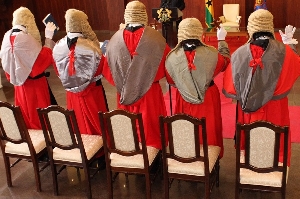Ghana’s newly elected leader, Nana Addo Dankwa Akufo-Addo faces an uphill task as he seeks to address the country’s economic malaise which has left Ghanaians impoverished and crippled many businesses.
Key macroeconomic reforms to address concerns over the high level of public debt, and investments in major infrastructure projects to alleviate Ghana’s long-running energy crisis are expected to be the focus for the new administration, the New Patriotic Party (NPP), led by Nana Akufo-Addo.
Anti-corruption will take a central focus including the introduction of legislation to tighten public procurement processes and to increase transparency in investment deals.
Mr Akufo Addo after his recent election victory says his immediate goal is to place the Ghanaian economy on a sound footing and provide jobs for the country’s teeming jobless youth.
“The Ghanaian economy has nosedived in the last five years; it’s been shrinking on an annual basis; we are saddled with low growth, widespread unemployment and huge debt; that’s the reality of our situation,” he told the BBC in Accra.
Ghana’s growing debt stock (GH¢112.4 billion as at September 2016), rising budget deficit set to hit 9 per cent by end of this year and high inflation (15.8 per cent), the highest after Nigeria will present major challenges for the in-coming government.
Economic analysts say Ghana is unlikely to get out of the woods any time soon. Dr Joe Abbey, Executive Director of the Centre for Policy Analysis (CEPA) tweeted “immediate economic recovery not guaranteed,” Dr Abbey warned the country to brace itself for some tough times ahead.
Former Finance Minister, Dr Kwesi Botchway was confident of an economic pick-up in 2017 but admitted that major challenges remain.
The in-coming administration will have to deal with high levels of unemployment; high duties and taxes; challenges within the private sector leading to workers lay-offs; high utility bills; high fuel prices emanating from excessive taxation; volatile energy situation.
According to Dr Raziel Obeng-Okon, Senior Lecturer at the Ghana Institute of Management and Public Administration (GIMPA), sluggish growth in GDP, over-exposure of the banks to BDCs and other businesses; financial distress of some state-owned institutions (SOEs) are economic challenges that continue to subdue growth of the economy.
He maintains that the new government would have no choice but to continue with the fiscal consolidation in the short term till it is able to generate enough inflows to fund its operations, pay outstanding liabilities and capital expenditures.
“Since the fiscal consolidation policy is aimed at reducing government deficits and debt accumulation, the new government needs to review the government’s debt management strategy and if need be fine-tune it to make it more efficacious,” he explained.
Dr Obeng-Okon said Mr Akufo Addo will have to dig deep to ride on the various labour agitations that docked his predecessor’s administration.
The Mahama administration witnessed frequent labour agitations from various quarters including medical doctors, pharmacists, laboratory technicians, nurses, lawyers, teachers, ECG employees and teacher trainee students.
According to the GIMPA lecturer, “these labour unrests emanated from poor remuneration, unpaid wages and allowances, gaps within the salary scale, lack of logistics, unpaid Tier-1 pension contribution to private fund managers.”
Business News of Friday, 16 December 2016
Source: thefinderonline.com













